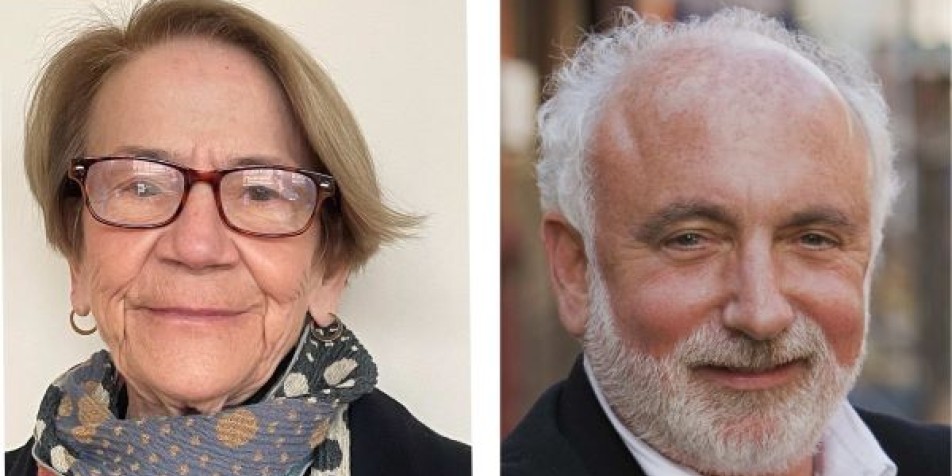Meet the Winners: Elizabeth Scott & Laurence Steinberg

This year, Juvenile Law Center will honor Elizabeth Scott and Laurence Steinberg as joint winners of the 2024 Leadership Prize. Scott and Steinberg have co-published critical papers on adolescent development and brain science that have inspired lawyers, judges, and lawmakers across the country to re-examine their pre-conceived notions about adolescent development, children’s rights, and the possibility of envisioning a more developmentally-appropriate approach to youth crime and delinquency. Together, they have generated seismic shifts in the national conversation of youth justice, and helped law and policy makers truly understand that kids are different—and the law should reflect that.
Shortly after graduating from the University of Virginia with her J.D. in 1977, Scott returned in 1978 to the University of Virginia School of Law to direct the Forensic Psychiatry Training Program of the Institute of Law, Psychiatry, and Public Policy. Two years later, she was named director of the Forensic Psychiatry Clinic. During her tenure as Director the Clinic, Scott collaborated with Virginia state officials to develop a program that trained county-level mental health professionals to evaluate criminal defendants more effectively in a community-based setting. In 1988, Scott joined the University of Virginia School of Law faculty where she taught many courses including criminal law and family law and interdisciplinary courses in psychiatry, psychology, criminal law, and juvenile/family practice. In 2006, Scott joined the faculty of Columbia Law School, where she served as the Harold R. Medina Professor of Law.
Steinberg received his PhD in Developmental Psychology from Cornell University in 1977. From 1977-1983, he was Assistant to Associate Professor of Social Ecology at the University of California, Irvine. From 1983–1989, he was Professor of Child and Family Studies at the University of Wisconsin–Madison, where he examined adolescent development through the lens of parent-child relationships, family structures, and how children explore autonomy and decision-making both within the family unit and in community with their peers. In 1985 Steinberg published the first edition of Adolescence, a seminal text in adolescent development soon to be in its 14th edition. He would make Temple University in Philadelphia his home in 1988 as a professor in the Department of Psychology and Neuroscience (formerly the Department of Psychology).
In the two decades leading up to their work together, beginning with their membership on the MacArthur Foundation Research Network on Adolescent Development and Juvenile Justice, which Steinberg directed, both Scott and Steinberg published an incredible amount of research. To give readers a sense of the scale of their collective bodies of work, their curriculum vitae together includes over 35 pages of research credits. In 2003, Scott and Steinberg’s collective visions culminated in their first publication together, Less Guilty by Reason of Adolescence: Developmental Immaturity, Diminished Responsibility, and the Juvenile Death Penalty. This work would go on to play a pivotal role in the landmark 2005 Roper v. Simmons Supreme Court decision that struck down the juvenile death penalty. Following this historic victory for children, Scott and Steinberg came together once again with the groundbreaking publication, Rethinking Juvenile Justice. This book begins with the story of Lionel Tate, whose case “suggests just how difficult it is to construct a juvenile justice policy that responds satisfactorily to the multiple challenges that society faces when dealing with youth crime.” Scott and Steinberg go on to say:
An optimal (or even adequate) juvenile crime policy must pursue and balance several goals. These include fair punishment of young offenders, which means recognizing their immaturity and yet also holding them accountable for their crimes. The goals also include fair hearings, as well as dispositions that will enhance rather than harm the future prospects of youths in the justice system and reduce rather than increase the likelihood that they continue their criminal activities. Last, but certainly not least, juvenile justice policy will fail unless it satisfies the community's need for retribution and assures adequate protection of public safety. Accommodating the tensions among these diverse policy goals is a daunting challenge.
Rethinking Juvenile Justice would go on to receive the Social Policy Award for “Best Authored Book” from the Society for Research on Adolescence in 2010. Scott served on the Board of Directors for Juvenile Law Center from 2003 – 2010, and in 2015 she was the lead author of The Supreme Court and the Transformation of Juvenile Sentencing commissioned by the John D. and Catherine T. MacArthur Foundation. Scott and Steinberg have continued to collaborate on several publications. Their most recent collaborative work, In Defense of Developmental Science in Juvenile Sentencing, was published in 2019. Steinberg also served on the Juvenile Law Center Board of Directors and in 2023 published his newest book, You and Your Adult Child: How to Grow Together in Challenging Times.
Today, Laurence Steinberg is a Distinguished University Professor and the Laura H. Carnell Professor of Psychology and Neuroscience at Temple University. He is also the former President of the Division of Developmental Psychology of the American Psychological Association and of the Society for Research on Adolescence. Elizabeth Scott is the Harold R. Medina Professor Emerita of Law at Columbia Law School and serves as the chief reporter for the American Law Institute Restatement on Children and the Law.
Juvenile Law Center invites you to celebrate Elizabeth Scott and Laurence Steinberg along with fellow Leadership Prize recipients Angel Rodriguez and Bryan Stevenson at the 2024 Leadership Prize, which will take place on Wednesday, May 8th, 2024, at 5:45pm ET. You can purchase tickets for the event here. Recipients of the Juvenile Law Center Leadership Prize are leading lights whose inspirational careers are beacons for future generations and whose work has substantially improved the lives of youth. Read more about our 2024 award recipients.
